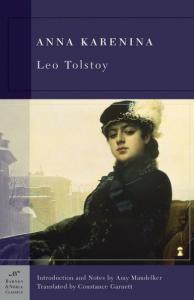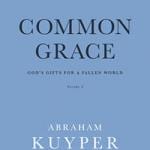I don’t know if Leo Tolstoy ever read Pride and Prejudice or not. If he did, I picture him closing the book with a snap, flinging across the room and shouting “No! That’s not how it goes! It’s cold and then they die!” He then stamped his boot down on the frozen Russian soil and out popped a fully grown Anna Karenina. Rather than a British “comedy of manners” we have a Russian “tragedy of manners.”
If it’s not clear by now, I don’t know a whole lot about 19th Century Russian literature. The introduction to the edition of Anna Karenina I’m reading (the Barnes and Noble Classics version–if you’re not familiar with this series of books, the ones I’ve encountered have been uniformly excellent) tells me that there really aren’t any comparable predecessors to Tolstoy’s novel of family, adultery, religion, class, philosophy, etc etc etc. Pushkin and Gogol provided literary background (among others, of course), but in Anna Karenina Tolstoy blazed the path that would be followed by later writers. Even Anna’s death would be echoed in books like Doctor Zhivago (where I am on much more familiar ground–and if you are one of the many people who never got to take Pavel Sigalov’s Soviet literature class, I pity you…).
And that said: spoiler alert! Though I don’t feel too bad about giving away the ending of a novel that’s nearly a 150 years old. Anna dies at the end. Or at least, Anna dies at the original end of the book. Shortly after sending the last chapter (Anna Karenina was published as a serial–again, echoes of English lit), Tolstoy decided he wanted to finish the story of Levin, the other lead character in the book, with Levin’s conversion experience. Or at least his religious experience, whichever it was.

As a newcomer to Tolstoy, I don’t know that I’m the best person to interpret the book. Certainly on the surface it’s the story of adultery, where the titular character leaves her family for her paramour (Vronsky), only to slowly go mad as a coldness grows between the two of them. (Or maybe her madness was caused by syphilis? I’m not completely sure how to read that…) By contrast, Levin (apparently the stand-in for Tolstoy himself) leaves behind naïve and shallow ideas about the world and finds fulfillment in a family, work, and God. The novel is about different ways of pursuing self-fulfillment, and the role society (particularly affluent, noble, society) has in that pursuit. Does our culture hold us back and destroy us when we try to strike out on our own (Anna)? Or is it, when properly balanced, a facilitator of the good life for the individual (Levin)?
Or maybe this is more of a theological novel. Maybe Anna is a type of Eve, seduced herself from the good life she enjoyed and in turn seducing others (the one time Anna meets Levin, we are told that she has taken on the habit of trying to make younger men fall in love with her–though without any intention of following through with their affections). She has gone from being a family restorer at the beginning of the book (she reconciles her sister with her unfaithful brother-in-law) to attempting to tear apart families (Levin is a newlywed when he meets Anna). Anna dies at the logical conclusion of the path she has taken: abandoning even the man she had abandoned her family for, alone with her madness she is crushed under a train.
Levin, by contrast, gains a family and returns to his ancestral farm, where he undergoes a spiritual struggle. Having read the great works of philosophy and found nothing satisfying, he is plagued with thoughts of suicide. It is only when he talks to a peasant and sees that peasant’s simple faith, he realizes that he has been searching for what is all around him. What he sees in the world, what he knows in his heart, and what is taught by the church, are not at odds with each other but in fact are harmonious aspects of the same reality:
“Lying on his back, he [Levin] gazed up now into the high, cloudless sky. ‘Do I not know that that is infinite space, and that it is not a round arch? But, however I screw up my eyes and strain my sight, I cannot see it not round and not bounded, and in spite of my knowing about infinite space, I am incontestably right when I see a solid blue dome, and more right than when I strain my eyes to see beyond it.
Levin ceased thinking, and only, as it were, listened to mysterious voices that seemed talking joyfully and earnestly within him.
‘Can this be faith?’ he thought, afraid to believe in his happiness. ‘My God, I thank thee!’ he said, gulping down his sobs, and with both hands brushing away the tears that filled his eyes.” (738-739)
This isn’t great theology (and I suspect there’s a reason I hear Dostoyevsky appealed to more for his religious thought than Tolstoy), and ignores even the basic truth of atonement. And yet, it is a good expression of one aspect of Christianity. We do know that the world is more complex that what we observe, but also that the complexity of which we know does not negate the physical reality we see. We do have to see the sky, know that there’s more behind it, and recognize the reality of both in harmony.
All that to say, this is an interesting and worthwhile book–and my imaginary Tolstoy is right, it’s certainly superior to Pride and Prejudice.
Dr. Coyle Neal is co-host of the City of Man Podcast and an Associate Professor of Political Science at Southwest Baptist University in Bolivar, MO












